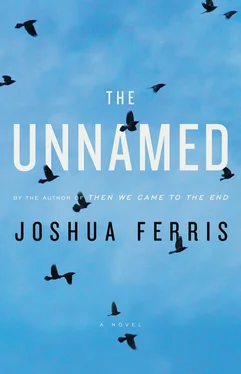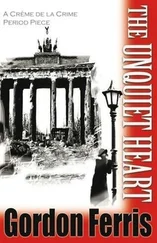They bolted an O-ring into a stud in the wall and tethered him with a chain and a belt made of leather. After a couple of days, that sort of containment was just too barbaric.
When the illness returned a second time, he thought of the treadmill. He’d beat his body at its own game, outwit dumb matter with his mind. But every time chance permitted him to have his body on the treadmill during an episode, he found himself stepping right off the revolving belt, into freedom. His body wouldn’t be contained or corralled. It had, it seemed to him, a mind of its own.
The lobby of his office building was set on a mezzanine. To access the street, one still had to ride down the escalator.
Frank Novovian looked up from his post, his eyes burdened with ripe bags, his cold-clock gaze greeting the world without humor. Yet he was deferential to the right people. “Good morning, Mr. Farnsworth,” he said.
“Frank, can I have a word?”
“Of course.”
Tim stepped onto the escalator. His feet continued to walk. He was forced to turn his head in order to further address the security guard. “Will you walk with me?”
Frank got off his stool and caught up with Tim long after he had stepped off the escalator. He was halfway across the lower lobby by then. “What can I do for you, Mr. Farnsworth?”
“There’s a man in our stairwell.”
“What man?”
“A homeless man.”
“In our stairwell?”
“Know what he’s doing there?”
He entered the revolving doors. He gestured for Frank to follow as he fought the wind pushing against the glass.
The uprush of city life, always unexpected. A far cry from his time behind the desk. Taxis heading past, cars, supply trucks, bundled men on bicycles delivering bagged lunches. Faces were as varied as the flags of the earth. A Hasidic Jew pushing a dolly in front of him weaved quickly between blustered walkers. The sidewalks were salt-stained; the cold swallowed him up. He walked into the wind, north, toward Central Park, a wind shaped materially by pole-whipped newspapers and fluttering scarf tails. The fabric of his suit snapped behind him angrily. His teeth were rattling. Poor Frank, forced out in nothing but his standard-issue security man’s blazer. Yet Frank followed him dutifully into the crystal heart of the season.
Could he send Frank for the pack? Frank would have to reenter the building, wait for the elevator, walk the hallway, head back down again. By then he’d be searching for one man among eight million.
“Frank,” he said, “R. H. Hobbs is expected later today.”
“Do you remember the floor the man’s on, Mr. Farnsworth?”
“Midthirties?”
Frank unclipped the walkie-talkie from his belt. “Two minutes and he’ll no longer be a problem.”
“Thank you, Frank.”
Frank cocked the walkie-talkie sideways at his mouth and radioed inside. A voice crackled back. He was in midsentence when Tim reached out. “Wait,” he said. Frank cut himself short and lowered the walkie-talkie in anticipation of further instruction, continuing to walk alongside him. “Wait a second, Frank.”
They approached an intersection clustered by pedestrians waiting for the light to change. He turned down the side street, walking opposite the one-way traffic he was inexplicably, almost mystically spared from throwing himself in front of, and Frank followed. Some failsafe mechanism moved him around red lights and speeding cars, moved his legs with a cat’s intuition around any immediate peril. Dr. Urgess had once pointed to that reprieve as proof he was in control at some conscious or at least subconscious level, although Dr. Cox later claimed that the body’s involuntary systems, especially its sense of self-preservation, were powerful enough to override and even determine specific brain mechanisms. One located the disease in his mind, the other in his body. First he had believed the one doctor and followed his instructions, and then he had believed the other and followed his instructions. Now he was crossing the street with Frank after the last car in line had made it through the light, and neither Urgess nor Cox had managed for all their curiosity and wisdom to bring a single thing to bear on the problem itself. Thank you for your beautiful theories, you expert professionals, thank you for your empty remedies. Frank kept peering over.
“I’d like you to leave the man alone,” said Tim. “Let him stay where he is.”
“I thought you wanted him gone.”
“Not anymore,” he said.
He was thinking of the way he’d been treated at African Hair Weaving the day before. White man walks in and asks for shelter, black women point to the folding chairs. Same white man walks past a homeless man seeking the very same shelter, has black man thrown out into the cold. Dharma guru Bindu Talati’s long-ago suggestion that some karmic imbalance might have caused a material rift that provoked his walking had claimed his imagination again, but partly he was just trying to be decent. “As a personal favor,” he said.
He looked over to drive the point home and saw that by some miracle a black wool cap had materialized on Frank’s once-steaming, egg-bald head. “There are perfectly good heat shelters in the city, Mr. Farnsworth.”
“There are, that’s true,” he said. “But by a strange coincidence I know the man, Frank. We went to high school together. He’s fallen on hard times. Will you do me the favor of seeing he stays put as long as he wants? And also make sure no one else harasses him?”
“I didn’t know he was a friend of yours.”
“A friend of sorts. From a long time ago.”
“Consider it taken care of then, Mr. Farnsworth,” said Frank, cocking the walkie-talkie at his mouth again.
“And Frank, I have to ask another favor of you,” he said. “Would you let me borrow your cap?”
With no hesitation Frank handed him the hat. Handed it off as if that had been the point of bringing it outside with him, its brief respite on top of his head merely a convenient place to store it until the request was made. Tim put the hat on and tucked in his singed ears, pinning them between warm scalp and rough wool. “Thank you, Frank,” he said.
“Is it the walking thing again, Mr. Farnsworth?”
Astonishment wiped his face clean of expression. No one at the firm knew — that he had made sure of. That had been the first priority. He had elegantly explained away his two earlier leaves of absence: everyone knew about Jane’s struggle with cancer. But now he wondered: did others know the real reason, and how many? Or was it simply true what they said, that Frank Novovian in security knew everything before anyone else?
“What walking thing?”
“From before,” said Frank.
“I don’t know what the hell you’re talking about, Frank.”
“Oh,” said the security man. “Never mind.”
“You can go back to your post now.”
“Okay, Mr. Farnsworth.” But Frank kept walking beside him. “Is there anything I can do for you, Mr. Farnsworth?”
There was never anything anyone could do. Jane could handcuff him to the headboard until his wrists couldn’t take another day, and Becka could feign understanding until she could flee the room again, and Bagdasarian could revisit the medical annals and run another MRI, and Hochstadt could design another pharmacological cocktail, and the Mayo Clinic could follow him with furrowed brows around the outskirts of Rochester again, and Cowley at the Cleveland Clinic could recommend psychiatric evaluation based on his patient’s “health-care-seeking behavior,” and Montreux’s Dr. Euler could throw up his hands again, Yari Tobolowski could prepare another concoction of bat-wing extract, Sufi Regina could smoke him with the incense promises of a spiritually guided life-force energy, his channels could be reopened and his mind-body connection yoga’d and Reiki’d and Panchakarma’d until he was as one, as a rock is as one — but the goddamned thing was back. Hope and denial, the sick person’s front and rear guards against the devastation of another attack, were gone.
Читать дальше












